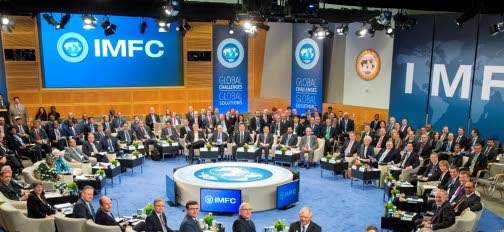An IMF meeting in Washington, DC, United States. Either way we look at it, IMF economics, while desired and accepted for macro stability, continue to problematise how the propertyless majority is marginalised in the economy they are keenly ready to kick-start.
Circumstances are rapidly maturing that are demanding our conception of the need for both a new style International Monetary Fund (IMF) and a 21st century post-IMF Caribbean economy.
The elements of the regional dialogue are coming together. They might constitute at this time a blurred image of an alternate Caribbean economy, but they are calling attention to the growing regional interest in a serious focus upon economic sustainability and resilience, and nation building — phase two.
The growth in social and economic inequality across the region in recent decades under IMF tutelage has been identified as a major concern. The recent United Nations Development Programme Caribbean Economic Report tells the starkest version of the story. It shows that while approved fiscal and financial arguments, and corresponding analytic tools, can explain the significant upward social mobility of the immediate post-independence, pre-IMF period, we seem impotent to prevent and understand the consequences of the daily descent into poverty from the middle class since the normalisation and domestication of the IMF.
The Caribbean is not only experiencing the systemic erosion of earlier social mobility gains, but the eruption of a new mental construct in which more citizens, seized in the grip of economic decline, are focused upon “getting out” and “getting even” with the nation.
Citizen versus State is emerging as a primary political feature of the IMF-ruled Caribbean. More citizens are feeling abandoned by the State-IMF alliance and consider it, in some places, an opposition force. We are seeing this anti-nation sentiment playing out in our cricket culture, and the deepening conflictual nature of urban living.
The sustainability of the nation seems imperiled without either violent repression or IMF reinforcements. This circumstance called into question the role of the IMF in the future of Caribbean democracy. For sure, the public perceives that IMF official thinking and tutelage place it on the battlefront where the social effects of its fiscals are fiercely felt.
Either way we look at it, IMF economics, while desired and accepted for macro stability, continue to problematise how the propertyless majority is marginalised in the economy they are keenly ready to kick start.
http://www.jamaicaobserver.com/news/imagining-the-post-imf-caribbean-economy_117303




Leave A Comment